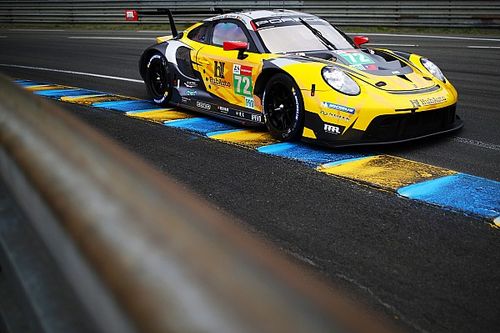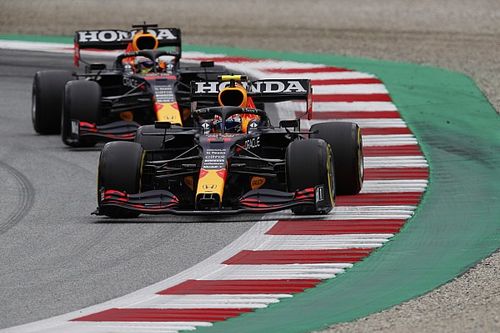Why Alpine is the kind of team F1 wants, and how that could pay off
As Formula 1's top teams face drastic cuts to stay under the ever-decreasing budget cap, Alpine's more compact size and independent nature could help usher in a new era of success for the kind of team F1 'wants'.

It might seem opportunistic and short-sighted to write this piece off the back of Esteban Ocon's shock win at the Hungarian Grand Prix, but in fact it would have been valid regardless of recent events in Budapest.
If anything, Ocon's maiden win and Alonso's tenacious, defensive masterclass just underline that Alpine has a driver line-up at its disposal that is capable of delivering the goods when given the chance.
After some car tweaks by Alpine, Ocon has recovered from an early season dip that made him lose confidence, while Alonso is almost fully up to speed after two years out of F1, which he freely admits has taken him "two races longer" than he anticipated.
But this is not about Alpine's unlikely win in Hungary, the first under its new guise after yet another Enstone metamorphosis, which would not have been possible under normal circumstances. Rather it is about what the outfit can do to hand its driver pairing that genuine chance to fight at the front and make success a more regular occurrence in the future.
Plenty of ink has been spilled over the long-awaited 2022 regulatory overhaul, which has been hyped up by F1 to such an extent during its one-year delay that one wonders if we might all get a bit disappointed come the first race of 2022.
What the all-new technical and financial regulations do undeniably offer, predominantly through Formula 1's steadily decreasing budget cap, is a chance to shine for the "kind of team that Formula 1 wants", as Alpine's executive director Marcin Budkowski put it. A team that didn't indulge in the excesses of a Mercedes, Red Bull or Ferrari but retained the in-house know-how to be a true constructor in every sense of the word, without outsourcing huge swathes of parts to third parties or relying on partner teams.

Esteban Ocon, Alpine A521
Photo by: Charles Coates / Motorsport Images
Along with midfield rivals McLaren and to a certain extent Aston Martin, the Enstone team, which was particularly underfunded in its Lotus days and still worked on relatively sensible budgets after Renault stepped back in, seems to be well placed to reconnect with its successful 2003-2006 era, which culminated in two world championships with Alonso.
Instead of having to go through the pains of downsizing to get below the $145 million budget cap, which Mercedes and Red Bull admitted was a gut-wrenching exercise that included lots of staff redundancies, Alpine will not have to drastically overhaul its team structure or technical departments, the reward for running a tight ship rather than trying to spend its way out of problems.
"We are lucky enough, if you want, to have an extra year to adapt to it compared to the big teams because we are below the cap quite significantly this year," Budkowski said.
"However, with the cap going down and a whole new car for next year we are above for next year, so we're there or thereabouts.
"In the discussions we've had with the FIA and F1 after the cap was lowered from 175 [million dollars] to the current 145, 140, 135 level, a few times it was mentioned that we are the kind of team that Formula 1 wants [going] forward in terms of size and structure.
"There are very different models around the pitlane in terms of make or buy. We produce a significant proportion of our parts in house in Enstone and to do that you just need more people.
"Some other people have smaller teams and do more outsourcing. But they are eventually spending a similar amount of money to us. And the cost cap is capturing this."

Marcin Budkowski, Executive Director, Alpine F1
Photo by: Charles Coates / Motorsport Images
What the cost cap glideslope does mean is that Alpine also needs to reflect on how to operate even more efficiently and produce next year's all-new machine without falling foul of the long overdue financial regulations, a task which is largely being shouldered by Budkowski.
"This year, we haven't had effectively to do anything to comply, because we're below, however compliance is not achieved overnight," Budkowski points out.
"In order to be compliant next year and effectively to reduce our costs, we've had to put a lot of work since last year and throughout this year.
"Honestly, it's probably taking 50% of my time when I'm back at the factory in terms of managing this process.
"Not only managing cost reductions, what we're effectively talking about is driving the team into working in a different way than it's been working so far, driving a lot of efficiency through the business."
With the caps on windtunnel and CFD hours, in reverse relation to teams' recent on-track success, every outfit has to think twice about putting a part through the loop.
Spending that precious time is only justified if the designers in the factory are convinced new developments will produce obvious performance gains.
"It just changes your approach to development, you have to make sure that every run counts but you have to make sure that you do more preparation before you actually put the part in the tunnel," Budkowski explains.

Fernando Alonso, Alpine A521
Photo by: Zak Mauger / Motorsport Images
"Before we engage a project, before we spend some money, we've got to be sure that it's going to do what it's supposed to do. We've got to pick the things we do and the things we don't, but we also have to make sure we work in the most efficient way.
"Now we're lucky enough to be there or thereabouts. We need to just do what we do but do it better and do it more efficiently."
With Alpine already naturally hovering around the budget cap, then, there is optimism within the team that F1's new era presents a golden opportunity, even if consistent success in a tough field may take a few more years.
Alpine's Viry-Chatillon engine division back in France is also banking on an all-new power unit for 2022 after largely carrying over its 2019 design all the way into this season.
Read Also:
Alonso, who despite celebrating his 40th birthday before Hungary is adamant he re-joined his old championship winning team for the long haul, thinks "no team has a guarantee that they will perform well", but backs Alpine's philosophy.
"I think this team has been always clever on interpreting rules, has been always fighting," the double F1 world champion said.
"It's not a team that has been spending a lot of money in Formula 1 in the past. So, I believe that with a cost cap, there is some advantage for these kinds of teams that are more efficient in terms of money and results, and money and windtunnel results as well.
"I think there's a chance to close the gap but there are no guarantees for sure."

Esteban Ocon, Alpine F1, 1st position, and Fernando Alonso, Alpine F1, celebrate in Parc Ferme
Photo by: Glenn Dunbar / Motorsport Images
Speaking a few days before his shock win in Hungary, Ocon said: "Obviously, the aim is to be winning at some point or to score podiums or to be close to the front.
"This is the target that the team has set for the future, maybe not next year, but that's going to be a long process.
"Those teams like Mercedes, they are on top of every subject for sure. We are working still on many different aspects.
"This year, there won't be any revolution, so if we see us scoring consistently with both cars in the points, getting the maximum out of the car, it's going to be a very strong second half.
"If you see us doing that, I think we could be in contention if we have a good car next year."
PLUS: The trait displayed by F1’s newest winner to earn Alpine’s trust
As Budkowski puts it, while the big three won't suddenly lose all their advantages and expertise, he "wouldn't like to be in their shoes" during their downsizing from mastodontic proportions.
"It must be a pretty painful process to go through" he points out. "However, I think they were just too big to actually have a sustainable future for the sport, because they were driving everybody's expenses up and that meant that for most teams it wasn't realistic to be competitive.
"I think it's probably come a bit late because teams have been allowed to grow beyond common sense and sustainability.
"I don't envy the process they're going through, it's painful, but I think for the sport going forward it's the right thing."
Related video
Why Alpine is the kind of team F1 wants, and how that could pay off
Trending
Trending Today
The F1 dilemma facing Mercedes' new world champion
After clinching the Formula E title at the Berlin finale, Nyck de Vries is a driver in demand. Although Mercedes would love to keep a reigning champion at the team, the allure of a Williams F1 drive may be too much for de Vries to ignore should a potential deal come to pass
The gradual decline and demise of F1's greatest innovator
Following the death of founder Colin Chapman, Team Lotus briefly revived before sliding towards oblivion – but what a glorious time this was, inducting Ayrton Senna into the pantheon of grand prix winners. DAMIEN SMITH describes the legendary team’s final seasons
The science involved in F1's tyre durability struggles
It’s fashionable among teams to knock the products offered by Formula 1’s sole tyre supplier, especially after the failures earlier in the season. But, as PAT SYMONDS explains, there are a number of unscientific myths behind these complaints against Pirelli
The last hurrah for a former British F1 superpower
Having tasted drivers' and constructors' success in 1962, the BRM Formula 1 team had fallen on hard times by the end of the decade. But the arrival of fresh faces and new cars gave it one more boost as the 1970s began
Why F1’s latest battleground offers unlimited opportunities
As Formula 1's push to bring costs down is limiting how much teams can use their state-of-the-art windtunnel facilities, the advancement in simulation technology and its limitless possibilities could soon be the determining factor in a team's success
Why it's too early to call F1's sprint race a success
OPINION: While the architects of Formula 1’s experimental ‘Sprint’ concept have declared victory, STUART CODLING says that at best it’s a qualified success – and considerably more data is required before enshrining it as a fixture in grand prix weekends
The mystery capitulation that denied F1’s ultimate enigma title glory
One of the defining Formula 1 drivers of his era, the late Carlos Reutemann should also have been a world champion. The reasons for the 1981 title slipping out of his grasp remain the subject of impassioned debate to this very day. GP Racing investigates…
How Mercedes became embroiled in its toughest F1 fight yet
After seven seasons of absolute dominance, Mercedes is now faced with a stark reality: through circumstances beyond its control it is struggling to maintain pre-eminence over one of its most ambitious rivals. Worst of all, it saw this scenario coming – but could do nothing about it, as GP RACING reveals




































